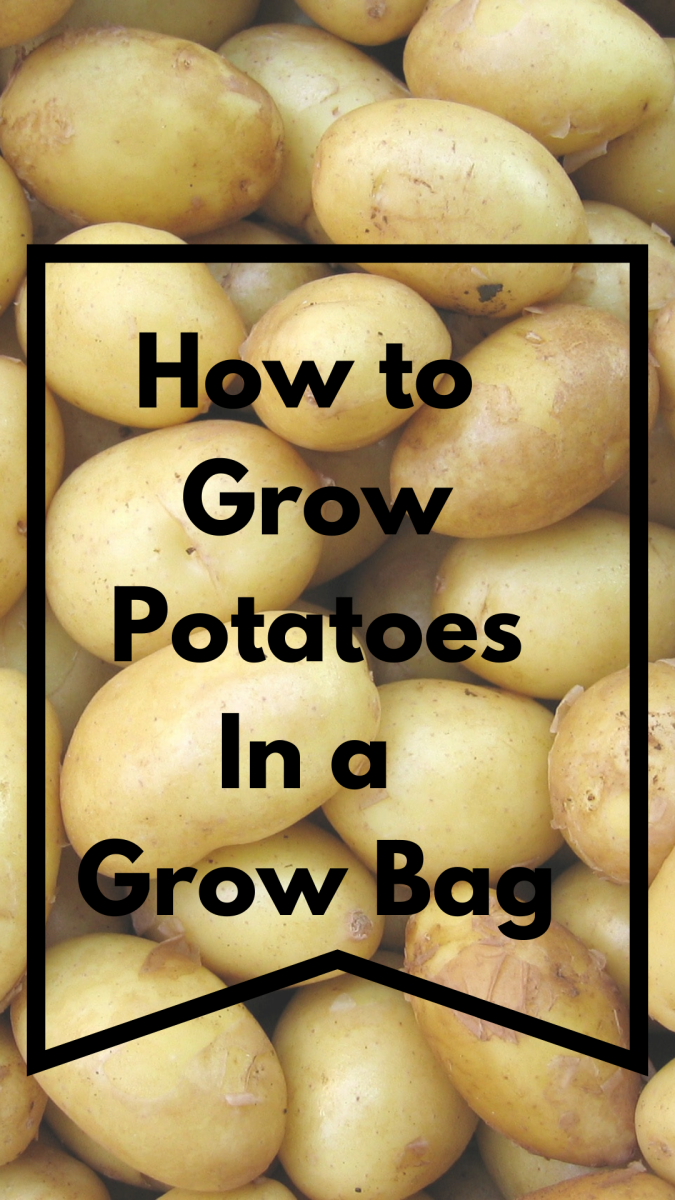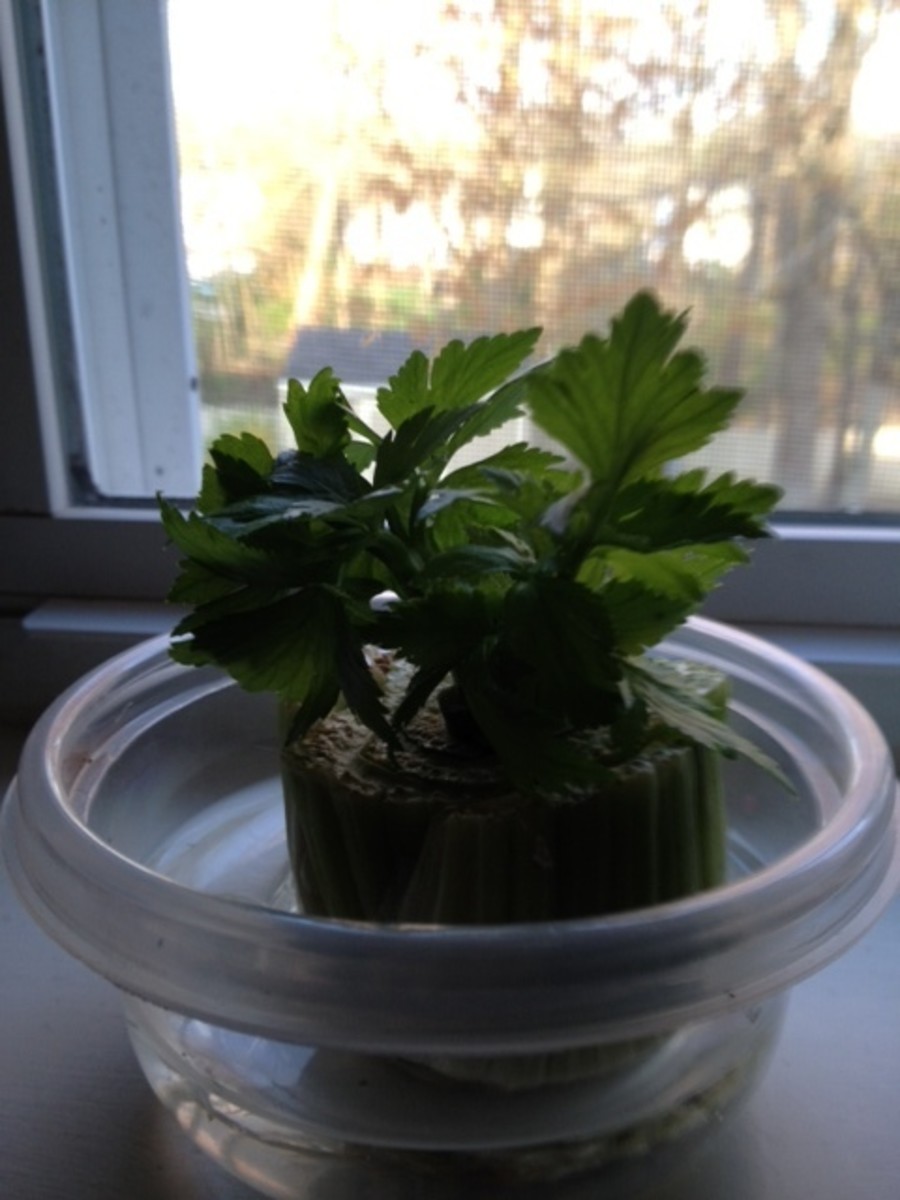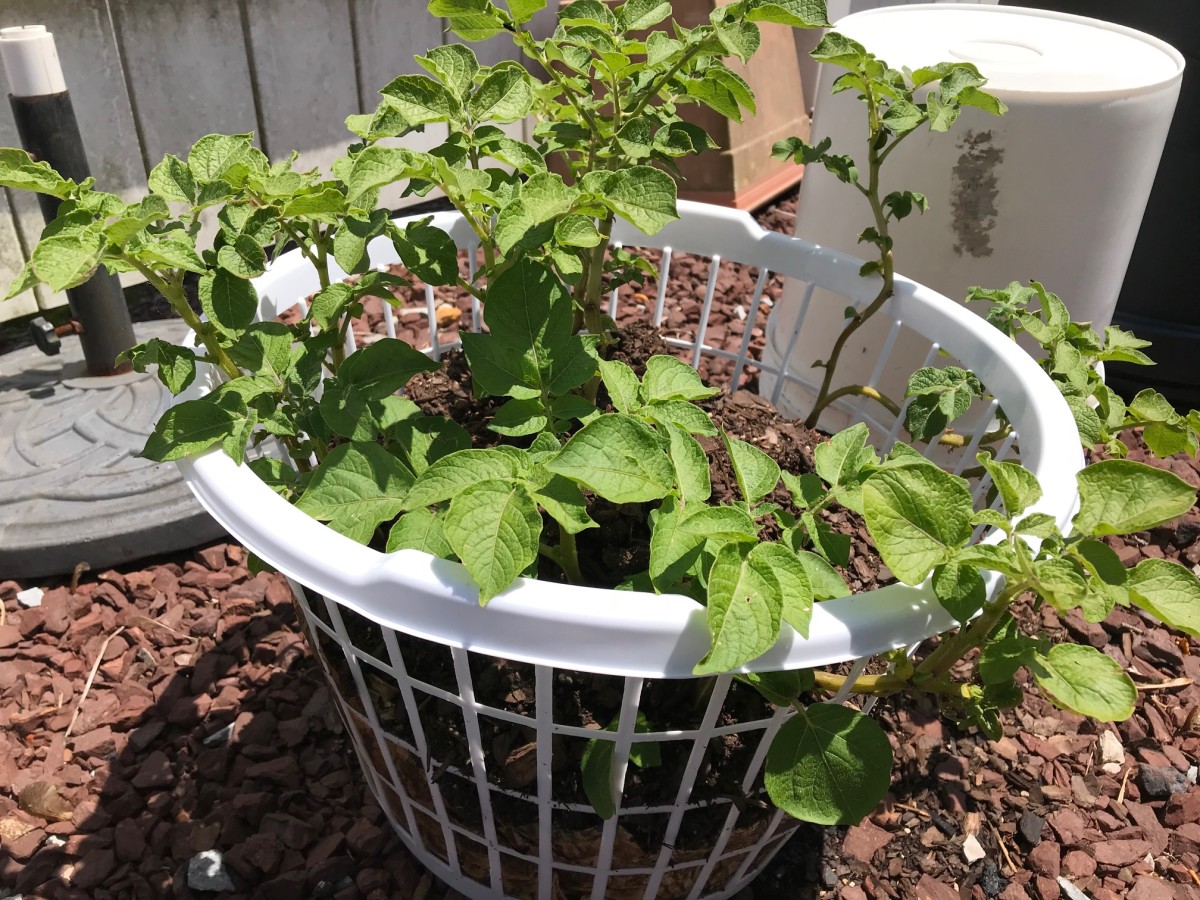Improve Your Garden Soil
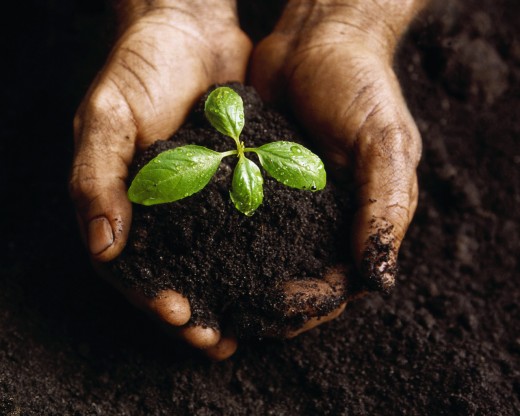
Feed the Soil
Perhaps the most important factor of a successful vegetable garden is having well prepared soil. That’s why the mantra of the organic gardener is “feed the soil, not the plant.” If you concentrate on “growing your soil”, you will be rewarded with a rich, nutritious growing medium that produces bountiful, healthy crops. Feed the soil and your crops will feed themselves.
If your soil is less than optimum, you can start a soil improvement program that will give positive results in just one season and become a productive, earthworm-filled garden bed in just a few years. The key to great soil is organic matter.
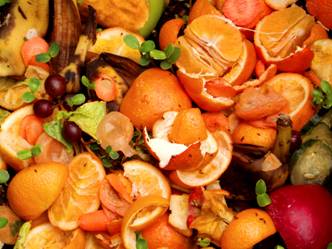
Why Organic Matter?
Organic matter is any living substance or, for our purposes, any matter that once was living and is now decomposing or decomposed. It is vegetable or animal matter, or the waste materials of animals (i.e. manure). Mother Nature is an organic gardener. If you take a walk in the woods and turn over the leaf litter under the trees you will find it teeming with insect life. That is the microherd, the soil organisms that are Mother Nature’s little helpers, busily assisting in the process of decomposition. As you dig deeper you find levels of organic matter in various stages of decomposition, and finally you will find black, rich, earthy- smelling humus, which is the end product of the process. This is how Mother Nature fertilizes her garden. The nutrients from the decomposed organic matter are released to the trees, which use them to create twigs, and leaves, and bark. When these components die, the trees shed them and they are returned back to the ground where they rot, feed the soil, and are again cycled back into plant growth.
Soil Life Cycle
You must create this same life cycle in your own garden. Here is why: Organic matter is the source of food for the microherd, so it drives most of the life processes in the soil. Nutrients are locked up in organic matter and become available to plants in a form they can use when the microherd digest and release them. Only then can plants can take up the nutrients and transform them into fruit, roots, leaves and stems.
As the plants take up the nutrients, however, they deplete them from the soil. Consequently, organic matter must be returned to the
garden to feed the microherd and restart the cycle. If you don’t add organic matter (i.e. feed
the soil), the soil will soon become lifeless and sterile. You must replace the organic matter used by your plants after every harvest!
Vegetables gardeners know that organic matter is the paradoxical magic elixir of the soil. If your soil is too sandy, add organic matter to make it richer. If your soil is too clayey, add organic matter to make it leaner and more friable. If it drains too slowly, add organic matter. If it doesn’t retain water well, add organic matter. There are not many soil problems that sufficient amounts of organic matter can’t cure!
Cool Calculator
- Gardenplace.com Mulch and Compost Calculator
Just type in the thickness of the compost layer you want and the square feet of your garden and the calculator will tell you how much you need of 2-cubic or 3-cubic bags; cubic feet or cubic yards; or pick-up truck full.
Make Your Own Compost
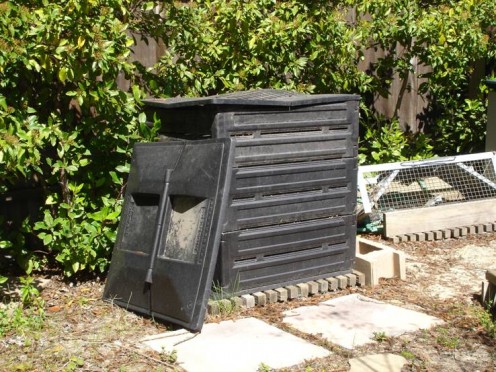
Compost Resources
- How To Compost
The name says it all. - Composting 101 - How to Make Compost
An informative guide to composting and compost bins! - Lyngso Garden Materials
Bay Area gardeners can buy compost in bulk from this source. - Bay Area Discount Compost Bin Program
Bay Area gardeners can get compost bins at discount prices in some counties. - Grow Better Veggies: Compost
This is a link to a good article on compost from Love Apple Farms located in Ben Lomand, California. - Contra Costa Solid Waste Authority
For Bay Area gardeners in particular, but the information is good anywhere! Learn compost "how to" skills.
Compost
The main source of nutrients and organic matter in a mature organic garden is compost. (I use the word "mature" here because most new gardens will require additional amendments.) Compost is simply a combination of plant, animal, and other organic materials that have been decomposed into a rich, black humus. You can either buy compost or make your own but you almost never have too much compost! Besides providing a steady supply of nutrients to the micoherd compost will:
- Break up clay soil
- Improve soil tilth, condition, and structure
- Improve aeration
- Moderate temperatures
- Improve drainage and water retention
- Suppress soil diseases and pests
- Store nutrients for gradual release
The secret to great compost is making it from a variety of materials! The best compost is made from organic matter from many different sources: grass clippings, leaves, food and kitchen waste, coffee grounds, animal manures, garden wastes, seaweed, hulls, soiled barn bedding etc. Think of it this way: you don't eat the same foods every day. You vary your diet and food choices to ensure you receive the proper vitamins and minerals from a variety of sources. Well, you don't want your plants to receive the same diet day after day either. For example, If all you feed your soil is composted steer manure, then your plants will have a diet high in nitrogen but deficient in potassium. If all you compost is maple leaves and grass clippings, your plants will eventually suffer from a deficiency of phosphorus and calcium.
Compost making is both an art and a science and cannot be discussed here in detail. I have provided resources so you can study the topic more in depth on your own. Just remember if you make your own, collect a variety or materials from multiple sources. If you buy compost at the store, buy a variety of different types and mix them together before adding them to the soil.
Caveat: Do not buy redwood compost for the garden! Redwood trees emit a natural toxin specially designed to limit competition from other plant life. You don't want to add this to your garden beds.
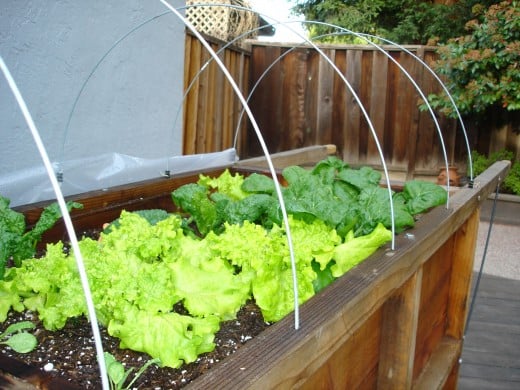
Whether you make your own or buy it, add compost during your first double dig or tilling of a new garden bed. The "compost rule of thumb" after that is to add a ½ to 1-inch thick layer every four months after you remove one seasonal crop and before you replace it with the next. This is a minimum of 6 and a maximum of 12, five-gallon buckets of compost for each 100 square feet of garden. Add twice as much if you have heavy clay soil or garden intensively.
If you are faithful about feeding your soil by adding compost you will be rewarded with the rich, friable soil that produces the finest crops.
Resources
- Five Year Organic Soil Amendment Program
Excellent information on soil amendments and a five year program to turn your garden soil into a healthy growing medium for your vegetables.
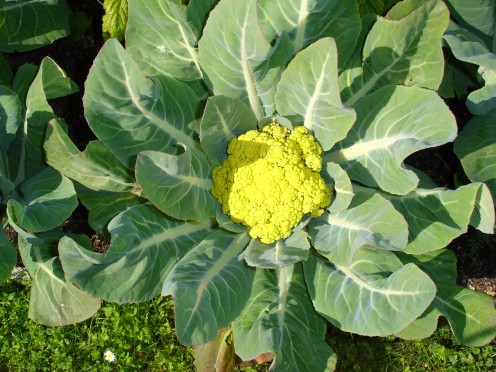
Amendments
Compost is a soil amendment, but in gardening jargon "amendments" differ from compost. Amendments are typically in a pure form, rather than a mix of organic matter from many different sources. For example, some amendments are high in nitrogen (N), some high in phosphorus (P), and some high in potassium (K). Others are high in calcium, iron, molybdenum, magnesium, boron, copper, zinc, sulfur, and the many essential nutrients for healthy plant growth. It is often necessary to add amendments to a new garden because the soil is so poor that compost alone will not sustain healthy plant life during the first few years of cultivation.
I have provided a link (above) to an excellent five-year soil
amendment program recommended by Common Ground, the affiliate of Ecology Action, a non-profit organization promoting the GROWBIOINTENSIVE™ method of sustainable agriculture. Under the direction of John Jeavons, author of How to Grow More Vegetables,
Ecology Action has researched and promoted Biointensive agricultural
methods worldwide since 1972 and is a leading advocate of sustainable
growing.
This soil amendment/improvement program stresses the three main building blocks of soil and plant nutrition: nitrogen, phosphorus, and potassium in pure forms such as alfalfa meal, phosphate rock, kelp meal, wood ash, egg or oyster shell, and greensand. (You can learn more about these essential nutrients in my Hub "Fertilizing Your Organic Garden" - see Related Hubs).
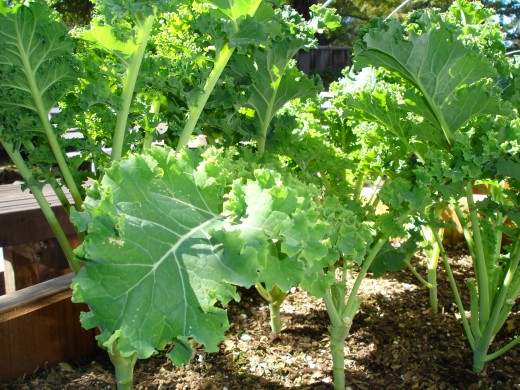

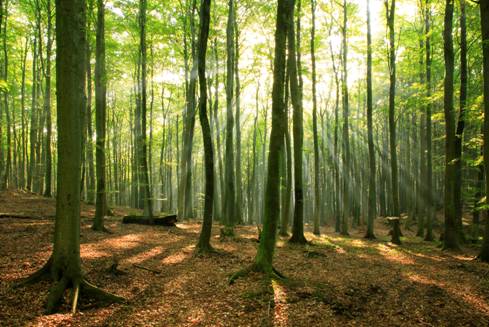
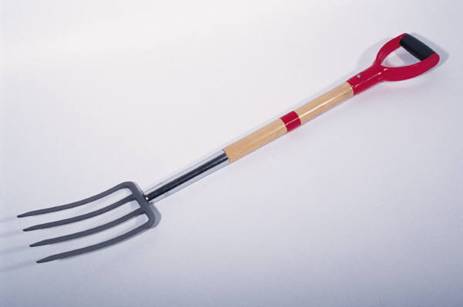
Adding Amendments
When you add amendments other than compost to your garden soil you need to follow three rules:
Introduce amendments to an active garden slowly.
Remember, you are feeding the soil and the microherd, not the plants.
The microherd needs time to break down complex compounds into simpler
forms that the plants can use. That's why organic amendments are described as "slow release". They become available for
plant use slowly. Unfortunately, they are leached away quickly by rain or watering so if you add too many
amendments at once they will simply go to waste. Excessive micro nutrients can also be toxic to plants just as excessive vitamins, such as vitamin A, can be toxic to humans. Don't overdo it!
Use a balanced "NPK" ratio. This means roughly equal amounts of nitrogen (N), phosphorus (P), and potassium (K). This is also known as a "complete fertilizer" and is represented by the numbers on fertilizer bags such as 2-2-2, 2.5-1-1, 10-6-10 or something similar. Don't add an amendment that is unbalanced or too "hot", such as one that reads 25-6-6! Unbalanced formulas cause poor plant growth and eventually harm the soil.
Go easy on the manure. Animal manures are highly favored by organic gardeners because they are rich in nitrogen, but beware of too much of a good thing! Too much manure will lower the pH of your soil, which will cause more problems than even organic matter can easily solve. Manure also favors nitrogen to the detriment of other essentials, and will thus upsets the nutrient ratio. Too much nitrogen can also cause excess plant foliage and no fruit. It may also contain chemicals and E coli, so know your source! Purchase organic certified products or only buy from livestock managers you know do not put chemical additives in their animal's feed.
When you add amendments sprinkle them on evenly in the recommended amounts. Add them to the upper 2" to 4" inches of soil, as does Mother Nature, and then gently fork it in. Don't rake amendments into the soil because it tends to create uneven concentrations.
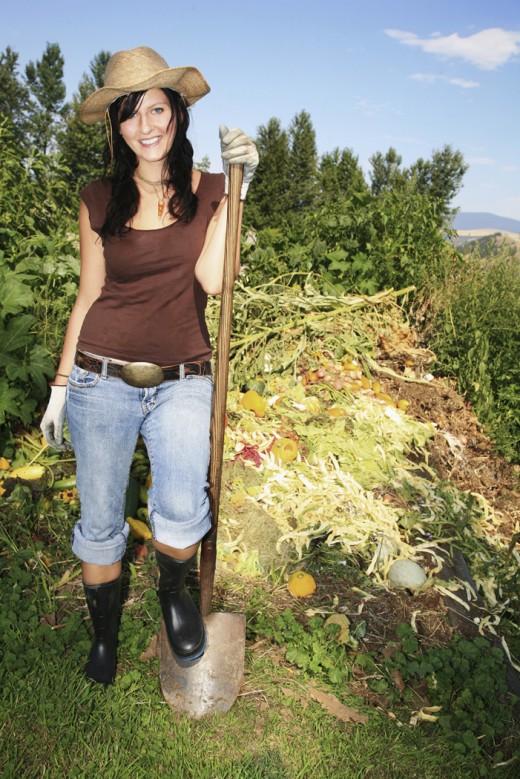
Adding Non-Composted Material
Most
gardeners have a steady supply of organic matter: kitchen scraps, pulled vines and plants, lawn
clippings, fallen leaves. Unfortunately,
it usually is just not enough to build a compost pile. But you don’t want to throw out all those
rich nutrients captured in this bounty and deprive your soil of a nourishing
feast. What to do? Adding non-composted organic matter to your
soil is great for improving beds for
future inclusion in your garden! Here
are some methods to try:
- Trench composting. This is not true composting, but it gets the job done. It is actually just slow double digging (See my Hub on double digging). You dig a trench where you want your future garden bed to go, loosen the subsoil, dump in your organic matter, then cover it with the soil you removed. Dig the next trench and repeat until you have dug and amended the entire bed. Do this in the fall and you will have a double dug and beautifully amended plot ready for planting in the spring. I actually use one of my raised beds for trench composting throughout the fall and winter because it does not get enough sun during those seasons. By the end of January I have amended the entire bed and by mid-February it is ready for peas.
- Sheet composting. If you don’t want to dig, sheet composting is for you. Just dump your organic matter at the site of your future bed and spread it evenly with a rake. Then cover it with a sheet of plywood, canvas tarp or other heavy material to keep animals from digging in it and wait until spring. You can then double dig or till the site and you will not need to import organic matter because it is already there!
- Spot composting. This is a useful technique if you are planting a fruit tree! Dig a hole where the tree will go, dump in the organic matter, cover with soil and wait 3 or 4 weeks. Then uncover the hole, plant the tree, and refill the hole. Your tree will have a great head start feasting on the nutrients derived from the organic matter. I also use this method with the large pots I use to grow tomatoes. Instead of removing all the soil and replacing it, I spot compost.
Just remember that adding non-composted material to the soil is great for improving areas for future inclusion in your garden. You don't want to use these techniques immediately before planting because you must give the microherd time to do their jobs and release the nutrients from the organic matter through decomposition. After adding non-composted material to your soil wait at least two weeks before planting!
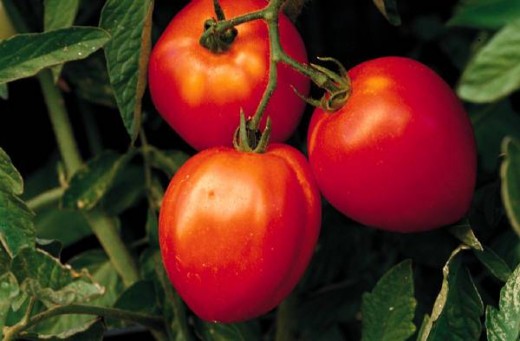
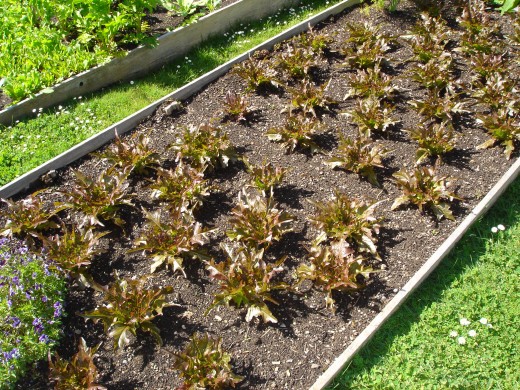
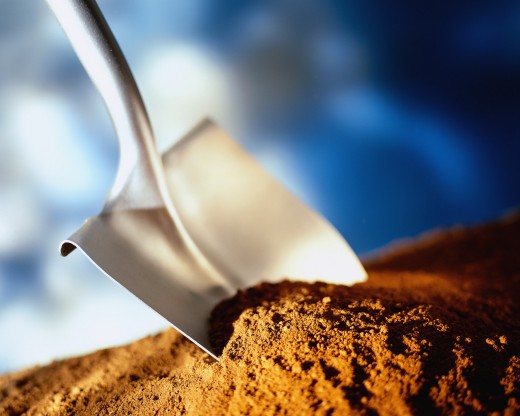
Online Resources
- Make Biochar: this Ancient Technique Will Improve Your Soil
You can increase your garden soils fertility by adding biochar. This soil-enhancing ingredient has been made for thousands of years in the Amazon. You can make it in your own garden by partially burning woody brush, making a kind of charcoal. - Gardening Resources, Cornell University
At the end of the growing season you may be ready to rest, but your garden is not. One final effort can make a big difference: cover cropping. Even small gardens will benefit from the use of cover crops, or "green manures". - How To Improve Your Garden Soil
Put this information to work in your own gardening efforts, you too will see and feel the magic in your garden soil. - How To Improve Your Soil
You can't really change your soil's texture but you can improve it.
Caring for Soil
After all your efforts to improve your soil you want to take good care of it! Contrary to what people may think, garden soil is very fragile and must be treated with care if it is going to continue its all-important work of growing vegetables for you. In fact, the soil needs the same care and attention that you lavish on your crops! Follow these basic steps and your soil will stay healthy and productive for years to come:
- Don’t leave it bare. Bare soil can get overheated in the summer and frozen in the winter; either way the soil organisms so important to the soil life process will be killed. Bare soil is also more vulnerable to wind or water erosion. Always keep your soil covered with plants or crops, a cover crop, or an organic or inorganic mulch. Farmers have used winter cover crops (such as alfalfa, crimson clover, winter vetch, and fava beans) for centuries to protect and enrich their land. The crops take up the soil’s nitrogen and store it until spring. It is then tilled under and decomposed by the microherd, releasing the nitrogen back to the soil which otherwise would have been leached away by winter rains. Mulches (such as straw, leaves, or plastic sheeting) can keep soil from overheating and freezing, and also from eroding.
- Be gentle. Be careful when you work your soil. Do not hack at it with a pickax, pound clods with a shovel, or over till it with a rototiller. Dig carefully, rake lightly, and hoe judiciously. Soil structure is easily damaged by rough handling. Just consider the Dust Bowl of the 1930s, which was caused, in part, by over working the land. In some areas of the mid-west the soil has still not recovered from the harsh treatment it received.
- Don’t over water. Plants need oxygen too and if the soil is waterlogged they will do poorly or die.
- Don’t use pesticides. While pesticides may get rid of plant destroying bugs, they will also kill the beneficials – the soil microbes that break down organic matter and release nutrients into the soil for your crops to use. Soil barren of its teeming microbe life is sterile.
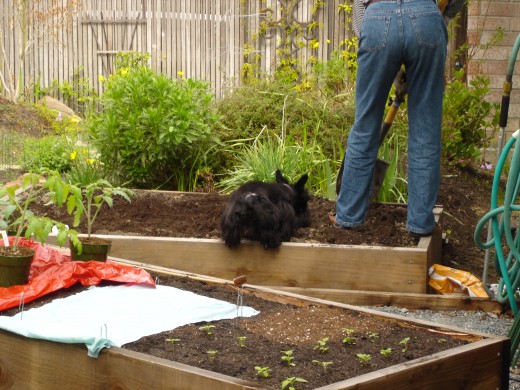
Don't get discouraged if your garden soil is poor. It can be improved in just one short season by adding organic matter and treating it with love and respect. If you add organic matter after every harvest you will soon see the soil become richer, more friable, textured, and teeming with life.
See you in the garden!

